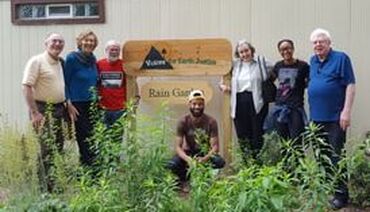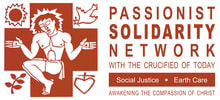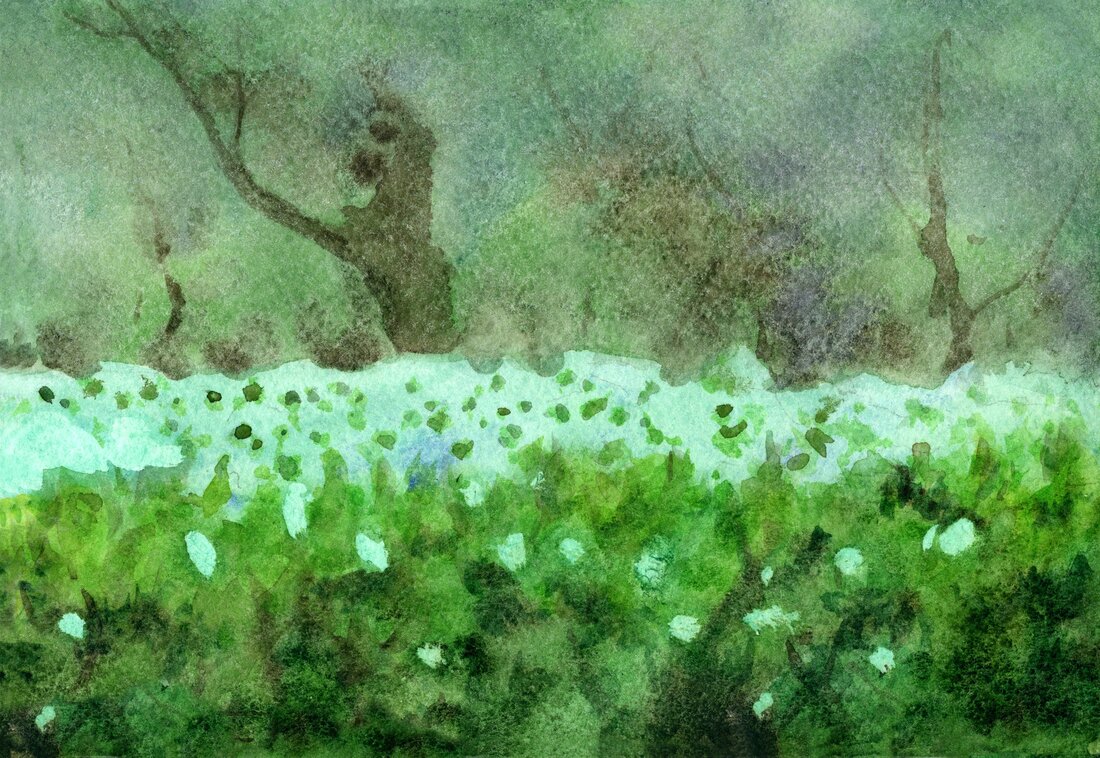Green Christian is embracing the current age as an ecological Passiontide by Paul Bodenham8/15/2020  Paul Bodenham is the Chair of Green Christian, a UK Passionist Partner, and here reflects on the charity’s work and mission. Over the last year we have seen a succession of dire scientific reports on the environment. Surely now no-one can now doubt the crisis we’re in. With climate change approaching tipping-point, dwindling wildlife, and rising tides of plastic waste, this is a hard time to hope. On the face of it there are two alternatives: succumb to despair, or whistle a happy tune and kid yourself that easy solutions are in our reach. If we talk about the environmental crisis at all, we incline to one or other of these alternatives. In our heart of hearts many of us know that they are both dangerous fallacies. But there is a third way.
0 Comments
Ray Sanchez describes the work moving forward at St. Anthony in the Fields, at Terrey Hills, a suburb of North Sydney in Australia. The parish was the birthplace of the Passionist Family Group Movement, and is now taking a lead in becoming a green church that is implementing the teachings of Pope Francis’ encyclical, Laudato Si. The post uses the words of those involved in the project, expressing their vision and hopes, the current state of their efforts and what has to be done. “The church buildings are flexible, providing space for meetings, forums, gatherings and dinners. We hold forums on ecological issues and their related impacts and on other social Justice issues. We also hold gatherings and concerts with our indigenous friends and our youth use church and grounds for their activities. For a number of years, the church has been turned into a warm and welcoming environment for a gathering in solidarity with survivors of abuse." Read the full blog post from JPIC AustraliaThe Passionist Charism and Care of Creation by Kyle Kramer, Passionist Earth and Spirit Center5/2/2019 Vowed and lay Passionists can find encouragement and guidance for ecological awareness and action not only from our pontiffs and other Church teachings, but also from the unique Passionist charism itself. In 2015, Pope Francis released his landmark encyclical, Laudato Si’. Widely ,(mis)categorized as “just” an environmental encyclical, Laudato Si’ is actually a bold statement about the deep interwoveness of spiritual, social, and environmental realities. “Everything is interconnected,” writes the Pope who took the name of the patron saint of ecology, “and…genuine care for our own lives and our relationships with nature is inseparable from fraternity, justice and faithfulness to others.” Even before Pope Francis, Saint John Paul II wrote in 1990 that “the ecological crisis is a moral issue.” Pope Benedict stressed that “[p]reservation of the environment, promotion of sustainable development and particular attention to climate change are matters of grave concern for the entire human family”, inseparable from “…the protection of human life, including the life of the unborn….”
 Resources provided as preparation for the June 14-16 annual province assembly of the Passionist Family of Holy Cross Province at St. Paul of the Cross Retreat Center in Detroit, Michigan. The provincial and council set the agenda, asking the group to reflect on Laudato Si’, the encyclical by Pope Francis, and its implication for our personal and communal lives. The Passionist Family of Holy Cross Province met from June 14-16, 2016 for their annual province assembly in Detroit at the St. Paul of the Cross Retreat Center. The provincial and council set the agenda, asking the group to reflect on Laudato Si’, the recent encyclical by Pope Francis, and its implication for our personal and communal lives. Over 100 participants were fortunate to have engaged two of the most prominent people in the field of religion and ecology to facilitate our meeting. Mary Evelyn Tucker and John Grimm are both senior lecturers at Yale University as well as the Divinity School, co-directors of the forum on religion and ecology, leading experts in the role of faith-based organizations in global efforts to care for the Earth, and students of Thomas Berry when they did graduate studies with him at Fordham University. Mary Evelyn served on the International Earth Charter Drafting Committee from 1997-2000 and was a member of the Earth Charter International Council until 2012. John is President of the American Teilhard Association. Mary Evelyn and John brought a breadth of knowledge and experience and helped us engage the message of Laudato Si’. In the weeks before the assembly, participants were asked to prepare with some readings and videos to form a good basis for the meaningful conversations we had about some of the major issues facing our human family at this time. The “assignments” were divided in four parts, and questions: [Click on the question titles to read a PDF version]
We offer these background materials for everyone who might want to further engage these issues in their own small groups or communities. The links will open PDF files with additional links to take you directly to the resources.
Also see Fr. Joe Mitchell's article on Earth Day 2016 By Fr. Ray Sanchez JPIC Australia In her book, “Resisting Structural Evil: Love as Ecological-Economic Vocation,” Lutheran theologian, Cynthia Moe-Lobeda argues for a ‘tectonic shift in our understanding of ourselves, and human beings, and our place on this planet. She, along with other theologians, recognises that foundational to the ecological crisis we are unleashing on this planet is our understanding of who we are and what is our purpose within the Cosmos, and particularly within the community of life that makes up Planet Earth. As people of ‘The Book,’ our Christian/Jewish/Moslem heritage means that our concept of self and purpose are founded on the creation story of the book of Genesis where God’s injunction, on creating humanity, is that we “’be fruitful, multiply, fill the earth and conquer it. Be masters of the fish of the sea, the birds of heaven and all living animals on the earth.’ God said, ‘See, I give you all the seed-bearing plants that are upon the whole earth, and all the trees with seed-bearing fruit; this shall be your food.’” (Gen 1:28-29 New Jerusalem translation) The result of our interpretation of this injunction, as God’s gift and word to us, we have developed an assumption of who we are in relation to the Cosmos and the living community of this planet. As Post-Modern Western society we have assumed that we are the benevolent masters of Isaac Newton’s mechanised world ordained by God to have dominion over it. That all the resources, living or non-living, are ours for the taking with no responsibility entailed, on our part, for the damage we do to the biosphere. As climate change relentlessly moves towards us, it is clear that this ‘myth’ has proved deadly. Even the more recent story we have replaced this myth with – that we are the unique stewards of the Earth, placed into it as caretakers – is inadequate because it is saving-earth-human-hands-holding-biologically false! The Earth, arguably, has no need of us. Indeed, far from being the creature upon whom Earth depends for care, human kind is utterly dependent upon Earth for our existence and survival. Not only are we dependent on the animals and plants for our food, we are dependent on the microbes cleaning our skin, the trees giving us breath, the plankton of the sea creating food, etc. The Earth is taking care of us! We are dependent on the sun and the Earth for everything. Without warmth, air, water, and fellow beings, we would quickly die. At the same time, we are co-creators of the Earth as we know it, shaping with our decisions the future of the places we inhabit, even as our relation to those places shapes us. In this way, we are members of a community of interdependent parts. I would suggest that the new paradigm we need to accept is that we are created to be in ‘relationship’ with all other. We are a creature of the Earth and we are made of the earth. In the words of St. Irenaeus of Lyons, we are ‘mud-creatures’ – in Hebrew, ha adam – crafted from adamah (‘dust of the very elements that existed with the big bang some 13.7 billion years ago and that comprise the soil). We are not above and outside of nature. We are of the animal kingdom, the phylum chordata, the genus homo, and the species homo sapiens. We are an integral and utterly dependent species in Earth’s tapestry of life. We share origins, body matter, and ultimate destiny with the Earth community. We need, in order to survive, the material goods that other humans and other-than-human parts of the planetary society also require and, thus, must in some way share those goods. In the words of The Blue River Declaration: An Ethic of the Earth: “Given that the Earth’s resources and resilience are finite, human flourishing depends on embracing a new ethic of self-restraint to replace a destructive ethos of excess. Greed is evolution-of-man-efnot a virtue; rather, the endless and pointless accumulation of wealth is a social pathology and a terrible mistake, with destructive social, spiritual, and ecological consequences. Limitless economic growth as a measure of human wellbeing is inconsistent with the continuity of life on Earth. It should be replaced by an economics of regeneration. Simple lifestyles that include thriftiness, beauty, community, and sharing are pathways to happiness. “Given that life on Earth is interconnected, are called to affirm that all flourishing is mutual and that damage to the part entails damage to the whole. Accordingly, our virtues are cooperation, respect, prudence, foresight, and justice. We have the responsibility to honor our obligations to future generations of all beings and to take their interests into account when we reflect on the consequences of our actions. To discount the future, to take all we need for our own wellbeing and leave nothing for others, is unthinkable. We should take only what the Earth offers, and leave as much and as good as we take. To live by a principle of reciprocity, giving as we receive, recreates the richness of life, even as we partake of it. Then, our harvests are respectful and thoughtful. We learn to listen, which means that we learn to value congeniality, patience, fairness, and moral courage, which creates the possibility of heroism in the face of disagreement and discord. Moreover, the new ethic calls us to remedy destructive distributions of wealth and power. It is wrong when some are made to bear the risks of the recklessness of others, or assume the burden of others’ undo some of the damage we have done, this is the best work available to us.” |
Categories
All
|




 RSS Feed
RSS Feed